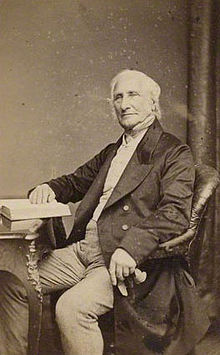Edward Sabine
|
Sir Edward Sabine KCB PRS |
|
|---|---|
 |
|
| Born |
14 October 1788 Dublin, Ireland |
| Died | 26 June 1883 (aged 94) East Sheen, England |
| Nationality | Irish |
| Fields | Astronomy, geophysics, ornithology, botany |
| Alma mater | Royal Military Academy (RMA) |
| Known for | Pioneer in terrestrial magnetism |
| Notable awards | Royal Medal (1849) |
General Sir Edward Sabine KCB PRS (14 October 1788 – 26 June 1883) was an Irish astronomer, geophysicist, ornithologist, explorer, soldier and the 30th President of the Royal Society.
Two branches of Sabine's work are notable: Determination of the length of the seconds pendulum, a simple pendulum whose time period on the surface of the Earth is two seconds, that is, one second in each direction; and his research on the Earth's magnetic field. He led the effort to establish a system of magnetic observatories in various parts of British territory all over the globe, and much of his life was devoted to their direction, and to analyzing their observations.
While most of his research bears on the subjects just mentioned, other research deals with the birds of Greenland (Sabine's gull is named for him), ocean temperatures, the Gulf Stream, barometric measurement of heights, arc of the meridian, glacial transport of rocks, the volcanoes of the Hawaiian Islands, and various points of meteorology.
Edward Sabine was born on Great Britain Street, Dublin to Joseph Sabine, a member of a prominent Anglo-Irish family whose connections with the country can be traced back to the seventeenth century. His mother, Sarah Hunt, died when he was just one month old. His elder brother was naturalist Joseph Sabine.
...
Wikipedia
